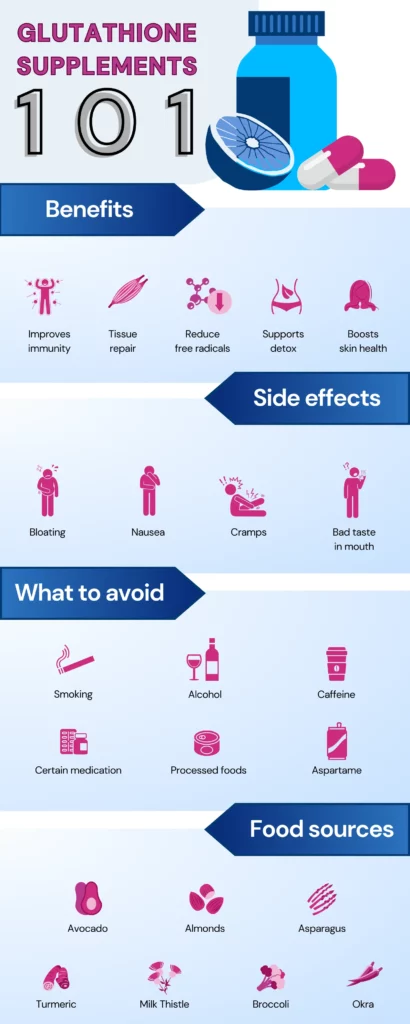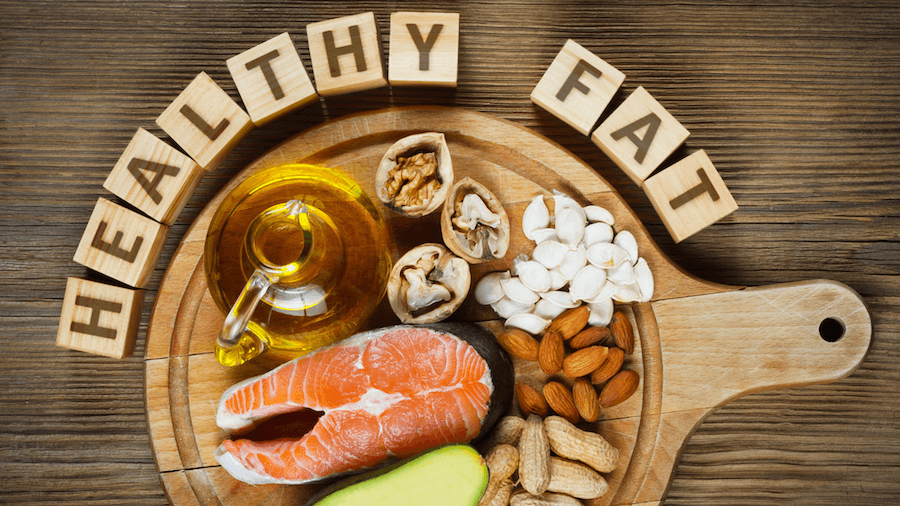From glowing skin to better immunity, glutathione plays a significant role in your body. As a supplement, its popularity is skyrocketing due to its antioxidant properties. However, modifying your diet with supplements can be complex. Cutting back on a few lifestyle habits may be the right call to get the most out of your glutathione supplements. From your morning coffee to your glass of wine in the evening, here’s what to avoid when taking glutathione.
Did You Know?
Many aspects of your skin health and aging, including the risk for conditions like adult acne, rosacea, tanning, and the likelihood of premature wrinkles, stretch marks, cellulite, etc., are highly influenced by your genes. You can learn more about your skin using your existing ancestry genetic test DNA data.
Glutathione: The King Of Antioxidants?
Glutathione, the ‘king of antioxidants,’ is made up of three kinds of amino acids - glutamic acid, glycine, and cysteine.
Its primary job is to tackle the threat of free radicals.
Free radicals are harmful compounds that build up in your body over time.
Left unchecked, they could cause oxidative damage to your cells.
More often than not, these free radicals build up in the mitochondria.
Antioxidants like glutathione help protect your cells from these free radicals by scavenging them in the mitochondria.
Glutathione’s ability to protect the mitochondria helps fight off autoimmune diseases like lupus that target the mitochondria.
The role of glutathione in the body is as follows:
- It helps mitochondrial function
- It helps improve immunity
- It helps neutralize free radicals
- It helps repair damaged tissues
- It helps detoxify possibly harmful compounds
- It helps regenerate the levels of vitamins C and E
- It helps transfer mercury out of body and brain cells
Due to these varied glutathione benefits, several dieticians, nutritionists, and physicians have only praises for it.
Annie Rubin, a registered dietitian, writes, “Glutathione is the body’s most potent antioxidant molecule and is also known as the Master Antioxidant.”
Why Do People Take Glutathione?
While the body usually produces adequate glutathione, stress, poor diet, or a chronic health condition can reduce glutathione levels.
Some people may be born with a change in the GSS gene responsible for producing glutathione synthetase, the enzyme that produces glutathione.
GSS gene mutations can severely decrease glutathione levels, leading to a deficiency disease. The symptoms of glutathione deficiency look like:
- Frequent infections due to poor immunity
- Loss of coordination and balance
- Seizures
- Excessive acid buildup due to free radicals
Doctors may suggest supplementation if you are low on glutathione.
Along with chemotherapy drugs, it can promote cell repair and flush out toxic substances.
Some studies suggest that higher glutathione can help manage body weight and fat percentage.
Interestingly, some people choose glutathione for its supposed ability to lighten skin tone.
However, it isn’t effective.
Any noticeable change is reversed soon after stopping glutathione.
What Forms Of Glutathione Are Available?
Glutathione is commonly available as:
- Reduced glutathione is an active form of glutathione and can effectively neutralize free radicals in the body.
- Acetyl glutathione is another form of active glutathione with more bioavailability, meaning your body can absorb it better.
- Liposomal glutathione: Here, the glutathione is encapsulated within a liposome, which helps improve absorption.
Glutathione supplements come in a variety of forms such as capsules, gels, liquid supplements, skin patches, sprays, and IV injections.
Recommended Dosage Of Glutathione
The NIH recommends taking 500-1000mg of glutathione daily (oral or liposomal) alongside other nutrient-rich foods to promote healthy glutathione levels in your body.
Remember to speak to your doctor or a licensed nutritionist about the right frequency and dosage of glutathione beforehand.
What To Avoid When Taking Glutathione
To prevent unpleasant side effects or lowered efficiency, here are a few things to avoid when taking glutathione supplements.
Smoking
Smoking is a preventable cause of oxidative damage in the body.
People who smoke regularly have increased levels of cadmium and malondialdehyde in their blood, which can lead to further cell toxicity.
Since glutathione primarily fights off oxidative stress and toxic pollutants, smoking may cancel out the beneficial effects of glutathione.
Alcohol
Excess alcohol consumption can damage the liver, which helps metabolize glutathione.
Like smoking, alcohol consumption also leads to oxidative damage by activating cytochromes and other reactive oxygen species.
The liver metabolizes alcohol to aldehydes, which cause hangovers.
While glutathione can help detoxify the body from aldehydes, this task impairs its overall efficiency in other parts of the body.
Glutathione may not be beneficial to the body if combined with alcohol consumption.
Certain Medications
While there are no specific drug interactions identified for glutathione, this does not mean there aren’t any.
Some experts say that analgesics like aspirin and acetaminophen can strain the liver when metabolized.
This task could deplete the body’s glutathione reserves.
If you are on medications, please talk to your doctor before starting glutathione.
Caffeine
Some studies have shown that moderate caffeine consumption reduces oxidative stress in the body.
However, caffeine consumption may reduce glutathione levels in the body.
Consuming caffeine and glutathione together may affect glutathione absorption levels and reduce its bioavailability.
So, to optimize glutathione supplementation, avoid coffee a few hours before or after taking the supplements.
Balancing out moderate coffee consumption with a diet that promotes glutathione levels is the best option.
Aspartame
Aspartame is a popular zero-calorie sweetener used in many foods and beverages to reduce overall sugar and calorie count.
However, if consumed regularly, it can lead to inflammation in the liver.
This inflammation due to long-term aspartame consumption may decrease reduced and oxidized glutathione levels in the liver.
Aspartame’s oxidative stress can take a toll on the adrenal gland as well.
Avoiding aspartame when taking glutathione may improve the effectiveness of the antioxidant.
Food Preservatives
There are two reasons why preservative-laden food and beverages may not benefit those on glutathione supplementation.
- Studies report that preservatives like sodium benzoate and sodium metabisulfite reduce glutathione levels in the body.
- Preserved, processed foods help improve shelf life but lack essential nutrients to boost natural glutathione levels or improve their bio-absorption.

Glutathione Side Effects
While regular doses of glutathione are generally well tolerated, high doses may be toxic to the body.
In rare cases, too much glutathione can cause diarrhea, nausea, vomiting, headaches, or skin rashes.
If you experience any new symptoms while on glutathione, stop taking it and speak to your primary care provider.
Individuals with existing health conditions must consult a doctor before using glutathione supplements.
Other FAQs On Glutathione
When Should Glutathione Be Avoided?
The effects of glutathione on pregnant or breastfeeding women haven’t been studied well.
Avoiding the supplement during these phases is better unless a doctor recommends it.
People with severe liver or kidney conditions must exercise caution while using any supplement.
What Can I Eat With Glutathione?
Some studies report that vitamin E and C levels help raise serum glutathione levels and make it more effective for the body.
Eating foods rich in vitamin E and vitamin C is one way to improve glutathione absorption.
Selenium, an essential mineral, is needed for the body to absorb and use glutathione.
Studies report that selenium supplements increased serum glutathione levels in just three months.
Foods like organ meat, beef, fish, cottage cheese, and brown rice are natural sources of selenium.
Does Glutathione Affect Menstruation?
It may not be accurate to say that taking glutathione can affect the menstrual cycle.
However, some studies report that taking glutathione while on your period may increase serum estrogen levels during menstrual cycles.
Estrogen is a beneficial hormone during the fertile periods of the menstrual cycle and plays a role in preparing the body for pregnancy.
Can I Take Vitamin D Along With Glutathione?
Vitamin D keeps your skeletal and immune systems healthy. You usually get it from the sun, so it could be challenging to maintain healthy vitamin D levels sometimes.
A study found that vitamin D supplementation with glutathione might be beneficial since it increases glutathione peroxidase-1 levels.
Consult a doctor or nutritionist before modifying, starting, or stopping a supplement regimen.
Natural Sources Of Glutathione
The following are some of the natural sources of glutathione.
Almonds
A 2007 study reports that almond consumption increases serum glutathione levels by up to 16% and reduces DNA damage by up to 29%.
Almonds also have various other health benefits and are beneficial when eaten regularly.
Turmeric
Turmeric is a yellowish spice used to add color and taste to food.
Curcumin, a chemical present in turmeric, is an excellent antioxidant.
Studies report that curcumin increases glutathione S-transferase (GST) activity in the liver.
Avocados
According to a 2017 study, avocado oil may help increase glutathione levels produced in the liver and offer enhanced antioxidant properties.
Sulfur-rich Foods
Consuming foods rich in sulfur amino acids may help improve glutathione synthesis, according to a 2011 study.
Some foods rich in sulfur amino acids are cruciferous vegetables, turkey, beef, chicken, nuts, legumes, allium vegetables like garlic, onions, leeks, and shallots, and leafy greens.
Milk Thistle
Milk thistle is a natural herb used for its medicinal properties.
It contains a compound called silymarin, which may help restore glutathione levels in the body and modulate the activities of the enzymes that metabolize glutathione.
Other Tips To Get The Most Out Of Your Glutathione (Safely)
Here are some other tips to help get the maximum effects of glutathione.
- Get enough sleep every day as sleep restores glutathione levels in the body naturally.
- Regular exercise may help restore glutathione levels and improve antioxidant activities.
- Reduce alcohol consumption and quit smoking when taking glutathione as they lead to excess oxidative stress and reduce the functioning of the supplement.
- A healthy diet provides all the necessary nutrients to boost serum glutathione levels.
- Mindfulness practices can help reduce stress levels and allow the body to metabolize glutathione effectively
Summary: What To Avoid When Taking Glutathione
- Glutathione is an antioxidant that helps reduce oxidative damage and improve immunity.
- Glutathione supplements are available over-the-counter and may benefit those with glutathione deficiency or lowered immunity.
- Alcohol, tobacco, excess caffeine, aspartame, and packed and processed foods may bring down the efficiency of the supplement and must be avoided when taking glutathione.
- Some natural sources that can help increase glutathione levels are turmeric, sulfur-rich foods, milk thistle, avocados, and almonds.
- In rare cases, glutathione supplementation can cause unpleasant side effects. Please talk to a healthcare provider before starting any new supplement.
Others Are Also Reading

Should You Take DGL Supplements For Treating Acid Reflux?

Supplements To Increase Brown Fat

Top 7 “Natural” Supplements Associated With Liver Damage
References
https://www.ncbi.nlm.nih.gov/pmc/articles/PMC3635210/
https://pubmed.ncbi.nlm.nih.gov/30116319/
https://pubmed.ncbi.nlm.nih.gov/32373172/
https://www.ncbi.nlm.nih.gov/pmc/articles/PMC5808366/
https://pubmed.ncbi.nlm.nih.gov/28187322/
https://pubmed.ncbi.nlm.nih.gov/21693129/
https://pubmed.ncbi.nlm.nih.gov/12622769/
https://www.ncbi.nlm.nih.gov/pmc/articles/PMC5413479/
https://www.thaiscience.info/Journals/Article/CMMJ/10905033.pdf
https://www.researchednutritionals.com/why-do-we-need-liposomal-glutathione/
https://www.cdc.gov/nchs/data/nhsr/nhsr183.pdf
https://www.ncbi.nlm.nih.gov/pmc/articles/PMC4090673/
https://pubmed.ncbi.nlm.nih.gov/8317379/
https://www.ncbi.nlm.nih.gov/pmc/articles/PMC4360843/
https://www.ncbi.nlm.nih.gov/pmc/articles/PMC7070325/
https://pubmed.ncbi.nlm.nih.gov/18029489/
https://pubmed.ncbi.nlm.nih.gov/9675878/
https://pubmed.ncbi.nlm.nih.gov/20471805/
https://pubmed.ncbi.nlm.nih.gov/20600218/
https://www.webmd.com/vitamins-and-supplements/glutathione-uses-risks
https://www.ncbi.nlm.nih.gov/pmc/articles/PMC7196133/
https://www.ncbi.nlm.nih.gov/pmc/articles/PMC4684116/
https://www.healthline.com/nutrition/how-to-increase-glutathione






